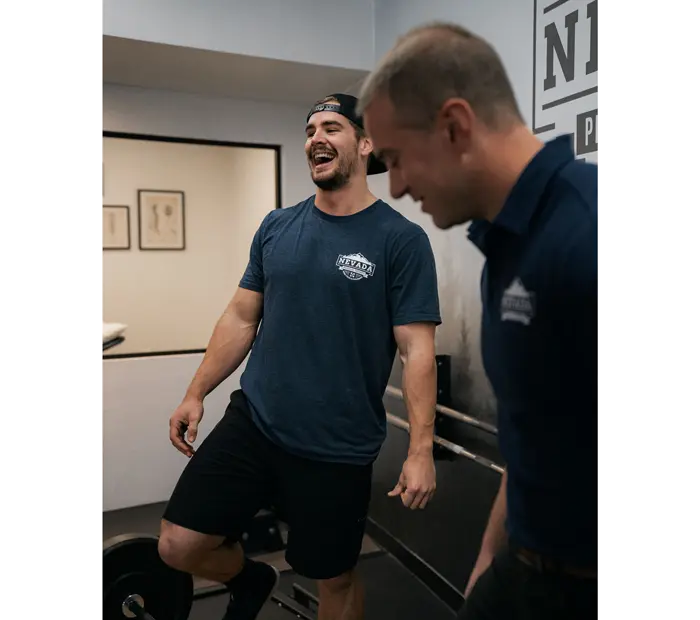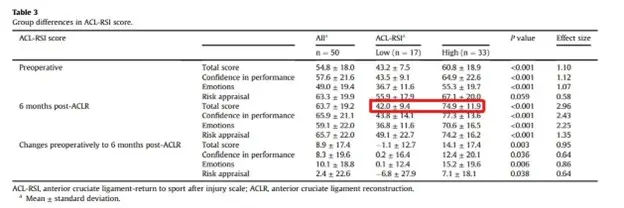
The ACL-Return to Sport after Injury Scale or ACL-RSI is a questionnaire developed by Webster et al. in 2008 to assess an athlete’s psychological readiness to return to sport. It consists of 3 metrics: emotion, confidence in exercise, and risk assessment and is typically scored from 0-100. For decades, we have known that fear of re-injury continues to be one of the primary limitations when it comes to getting an athlete back to their pre-injury competitive activities (Alswat et al., 2022). Recent research has expanded dramatically to investigate many other psychological considerations and their consideration in RTS decision making (Du et al, 2022). In several studies comparing various measures and their predictive power for RTS, the ACL-RSI was consistently shown to be one of the most robust predictors (Mueller et al, 2015, Ardern et al., 2013). This psychological readiness scale is a key component in the Nevada Physical Therapy Return to Sport testing battery and how it relates to predicting outcomes with individuals who have recently undergone ACL reconstruction.
In a study completed by Langold et al. not long after the creation of the ACL-RSI, researchers assessed ACL-RSI scores at the 3, 6 and 9 month marks after ACL reconstruction and were one of the first to begin identifying thresholds separating those who returned to pre-injury levels and those that did not. Those that had a successful outcome, i.e. returned to competitive sports, scored higher than those that did not at all measurable points.

Image source: Langold et al., 2009
Mueller et al. reported those that returned to level 1 sports scored on average 71 +/- 15 pts compared to those that did not scored 48 +/- 27 pts at time of follow up (2015). Similarly, in a more recent publication, Ohji et el. (2019) showed nearly identical scores between similarly described groups.

Image source: Ohji et al, 2019
No current acceptable cutoff although most research uses >56 points as a minimum threshold (Ardern et al. 2013) and identifying athletes scoring below this metric during their rehab process may inform clinicians on potential risk factors affecting their athletes’ ability to return to sport as well as potential re-injury. Mcpherson et al. published an article in 2019 showing a statistically significant correlation between ACL-RSI scores and younger athletes who went on to re-injure (60.8 +/- 19.1 for the re-injury group vs 71.5 +/- 19.3 pts in those that did not).

Image source: McPherson et al., 2019
As briefly described above, the ACL-RSI has consistently been shown to predict those that may fail to return to pre-injury activity levels although it should be noted that the mechanisms of this relationship are still poorly understood. From an intervention standpoint, knee extension strength appears to be related to an athlete’s confidence when it comes to returning to high level sport. Lepley et al. demonstrated an athlete’s knee extension isometric performance predicted 39% of the ACL-RSI score variance (2018).
When it comes to getting an athlete back to competitive sport, the process requires treating far more than just the knee. Appreciating the individual, their goals, fears, and concerns as well as the function of their knee is paramount to their success and Nevada Physical Therapy is uniquely focused on the biological as well as psychosocial contributors during this process.
References:
Alswat, M. M., Khojah, O., Alswat, A. M., Alghamdi, A., Almadani, M. S., Alshibely, A., Dabroom, A. A., Algarni, H. M., & Alshehri, M. S. (2020). Returning to Sport After Anterior Cruciate Ligament Reconstruction in Physically Active Individuals. Cureus, 12(9), e10466. https://doi.org/10.7759/cureus.10466
Ardern, C. L., Taylor, N. F., Feller, J. A., Whitehead, T. S., & Webster, K. E. (2013). Psychological responses matter in returning to preinjury level of sport after anterior cruciate ligament reconstruction surgery. The American journal of sports medicine, 41(7), 1549–1558. https://doi.org/10.1177/0363546513489284
Du, T., Shi, Y., Huang, H., Liang, W., & Miao, D. (2022). Current study on the influence of psychological factors on returning to sports after ACLR. Heliyon, 8(12), e12434. https://doi.org/10.1016/j.heliyon.2022.e12434
Erickson, L. N., Jacobs, C. A., Johnson, D. L., Ireland, M. L., & Noehren, B. (2022). Psychosocial factors 3-months after anterior cruciate ligament reconstruction predict 6-month subjective and objective knee outcomes. Journal of orthopaedic research : official publication of the Orthopaedic Research Society, 40(1), 231–238. https://doi.org/10.1002/jor.25120
Langford, J. L., Webster, K. E., & Feller, J. A. (2009). A prospective longitudinal study to assess psychological changes following anterior cruciate ligament reconstruction surgery. British journal of sports medicine, 43(5), 377–381. https://doi.org/10.1136/bjsm.2007.044818
Lentz, T. A., Zeppieri, G., Jr, George, S. Z., Tillman, S. M., Moser, M. W., Farmer, K. W., & Chmielewski, T. L. (2015). Comparison of physical impairment, functional, and psychosocial measures based on fear of reinjury/lack of confidence and return-to-sport status after ACL reconstruction. The American journal of sports medicine, 43(2), 345–353. https://doi.org/10.1177/0363546514559707
Lepley, A. S., Pietrosimone, B., & Cormier, M. L. (2018). Quadriceps Function, Knee Pain, and Self-Reported Outcomes in Patients With Anterior Cruciate Ligament Reconstruction. Journal of athletic training, 53(4), 337–346. https://doi.org/10.4085/1062-6050-245-16
McPherson, A. L., Feller, J. A., Hewett, T. E., & Webster, K. E. (2019). Psychological Readiness to Return to Sport Is Associated With Second Anterior Cruciate Ligament Injuries. The American journal of sports medicine, 47(4), 857–862. https://doi.org/10.1177/0363546518825258
Müller, U., Krüger-Franke, M., Schmidt, M., & Rosemeyer, B. (2015). Predictive parameters for return to pre-injury level of sport 6 months following anterior cruciate ligament reconstruction surgery. Knee surgery, sports traumatology, arthroscopy : official journal of the ESSKA, 23(12), 3623–3631. https://doi.org/10.1007/s00167-014-3261-5
Ohji, S., Aizawa, J., Hirohata, K., Ohmi, T., Mitomo, S., Koga, H., & Yagishita, K. (2021). The psychological readiness to return to sports of patients with anterior cruciate ligament reconstruction preoperatively and 6 months postoperatively. Physical therapy in sport : official journal of the Association of Chartered Physiotherapists in Sports Medicine, 50, 114–120. https://doi.org/10.1016/j.ptsp.2021.04.009
Suzuki, M., Ishida, T., Matsumoto, H., Kaneko, S., Inoue, C., Aoki, Y., Tohyama, H., & Samukawa, M. (2022). Psychological readiness at 9 months after anterior cruciate ligament reconstruction -which factors affect?. Physical therapy in sport : official journal of the Association of Chartered Physiotherapists in Sports Medicine, 58, 74–79. https://doi.org/10.1016/j.ptsp.2022.09.007

